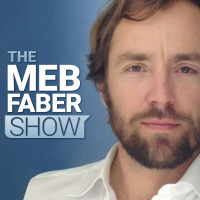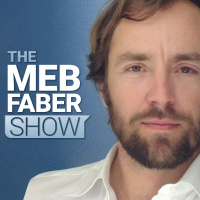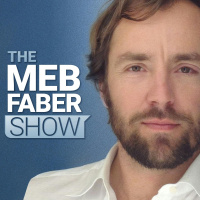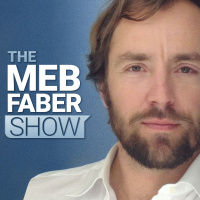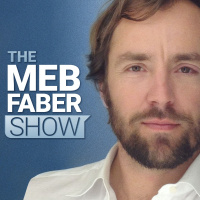Sinopsis
Ready to grow your wealth through smarter investing decisions? With The Meb Faber Show, bestselling author, entrepreneur, and investment fund manager, Meb Faber, brings you insights on todays markets and the art of investing.Featuring some of the top investment professionals in the world as his guests, Meb will help you interpret global equity, bond, and commodity markets just like the pros. Whether its smart beta, trend following, value investing, or any other timely market topic, each week youll hear real market wisdom from the smartest minds in investing today. Better investing starts here.For more information on Meb, please visit MebFaber.com. For more on Cambria Investment Management, visit CambriaInvestments.com. And to learn about Cambrias suite of ETFs and other investment offerings, please visit CambriaFunds.com.
Episodios
-
Tom Barton - The Biggest Problem Investors Have is Things Change...and They Don't Change | #125
10/10/2018 Duración: 01h27minIn Episode 125, we welcome famed short-seller and early stage investor, Tom Barton. We start by going way back, after Tom graduated from Vanderbilt. He walks us through his early career experiences which helped him sharpen his business analysis skills, as well as his operational skills. He developed a great understanding of different industries, yet also what it was like to actually work in them. This was the foundation for the short-selling career that was soon to begin. In 1983 Tom went to work for a wealthy Dallas family, and in the process met one of the original fraud short-sellers, nicknamed “The Mortician”. Tom knew nothing about stocks at that point, but under the guidance of his new mentor, realized that his analytical skills aligned perfectly with sniffing out short-selling candidates. He reasoned “isn’t it easier to spot something that’s going to fail than be certain on something that’s going to succeed?” He then began digging into the research, and finding slews of fraudulent companies. What follo
-
Bonus Episode: Wes Gray - Factor Investing is More Art, and Less Science
08/10/2018 Duración: 53minWe recently published The Best Investment Writing, Volume 2. The first book was a hit, with MoneyWeek concluding that it “should be on every investor’s bookshelf.” But we made the second volume even better – we expanded it to include 41 hand-selected investment articles, written by some of the most respected money managers and investment researchers in the world. We thought it would be fun to bring on some of the authors so that they could read their specific chapter from the book. That’s what you’re getting in today’s special bonus episode. If you’re interested in picking up a copy of The Best Investment Writing, Volume 2, head on over to Amazon or our publisher’s website, which is Harriman House. Also, know that your purchase would benefit charity, as all writer-proceeds go to the charity of the specific author’s choosing. So, enough from me, let’s let Wes take over with this special bonus episode. Learn more about your ad choices. Visit megaphone.fm/adchoices
-
Howard Marks - It's Not What You Buy, It's What You Pay for It That Determines Whether Something is a Good Investment | #124
03/10/2018 Duración: 44minIn Episode 124, we welcome legendary investor, Howard Marks. Meb begins with a quote from Howard’s new book, Mastering the Market Cycle, and asks him to expound. Howard gives us his top-line take on market cycles, ending with the idea that if you understand them, you can profit from them. Meb follows up by asking about Howard’s framework for evaluating where we are in the cycle. Rather than look at every input as individual, Howard looks at overall patterns. What is the collective mood? Or is it depressed, sad, and people don’t want to buy? Or is it buoyant? Second, are investors optimistic and thrilled with their portfolios and eager to add more, therein increasing risk? Or are investors regretful and hesitant, burned by recent experience? Then there are quantitative aspects – valuations, yield spreads, cap rates, multiples, and so on. All of these variables help give Howard a feel for whether assets are high- or low-priced. Next, Meb asks Howard to use Oaktree’s actions during the Financial Crisis as a rea
-
Bonus Episode: Russel Kinnel - Mind the Gap
01/10/2018 Duración: 10minWe recently published The Best Investment Writing, Volume 2. The first book was a hit, with MoneyWeek concluding that it “should be on every investor’s bookshelf.” But we made the second volume even better – we expanded it to include 41 hand-selected investment articles, written by some of the most respected money managers and investment researchers in the world. We thought it would be fun to bring on some of the authors so that they could read their specific chapter from the book. That’s what you’re getting in today’s special bonus episode. If you’re interested in picking up a copy of The Best Investment Writing, Volume 2, head on over to Amazon or our publisher’s website, which is Harriman House. Also, know that your purchase would benefit charity, as all writer-proceeds go to the charity of the specific author’s choosing. So, enough from me, let’s let Russel take over with this special bonus episode. Learn more about your ad choices. Visit megaphone.fm/adchoices
-
Fabrice Grinda - We're Still at the Very Beginning of the Tech Revolution... We Are Day One | #123
26/09/2018 Duración: 01h49sIn Episode 123, we welcome entrepreneur and renowned angel investor, Fabrice Grinda. The guys begin by discussing their mutual love for skiing, talking about heli-skiing in Canada, powder skiing in Japan, and the steeps of Chamonix in France. Meb asks Fabrice to recap his background. What follows is a fascinating look at the professional path of a wildly-successful entrepreneur and angel investor. Fabrice’s history involves consulting with McKinsey, building the equivalent of eBay in Europe and South America, starting another company that brought ringtones, mobile games, and wallpaper to the US (and eventually did $200M in revenues), and then consulting for fellow CEOs. Ultimately, Fabrice and his partner launched FJ Investments, which is where he’s currently focused. Meb asks about Fabrice’s investment approach and the frameworks he uses. Fabrice tells us he invests in about 75 new startups each year, mostly seed and pre-seed. He writes smaller checks (about $500K), as compared to the bigger VC firms. He pr
-
Bonus Episode: Rick Friedman & Anna Chetoukhina - FAANG SCHMAANG
24/09/2018 Duración: 20minWe recently published The Best Investment Writing, Volume 2. The first book was a hit, with MoneyWeek concluding that it “should be on every investor’s bookshelf.” But we made the second volume even better – we expanded it to include 41 hand-selected investment articles, written by some of the most respected money managers and investment researchers in the world. We thought it would be fun to bring on some of the authors so that they could read their specific chapter from the book. That’s what you’re getting in today’s special bonus episode. If you’re interested in picking up a copy of The Best Investment Writing, Volume 2, head on over to Amazon or our publisher’s website, which is Harriman House. Also, know that your purchase would benefit charity, as all writer-proceeds go to the charity of the specific author’s choosing. So, enough from me, let’s let Rick take over with this special bonus episode. Learn more about your ad choices. Visit megaphone.fm/adchoices
-
Phil Haslett - It's a Place to Connect Interested Buyers and Interested Sellers...in Late-Stage, Pre-IPO Tech Shares | #122
19/09/2018 Duración: 01h29sIn Episode 122, we welcome investor and entrepreneur, Phil Haslett. Meb jumps in, asking Phil to tell us more about his company, Equity Zen. Phil gives us an example involving a hypothetical employee. This employee owns equity in her private company but wants some liquidity from her stock options. Equity Zen is a platform where she can sell some her shares to a private investor looking to investor in that company, even though it’s not a publicly-traded company. So, Equity Zen is a place that connect buyers and sellers of late-stage, private companies that are pre-IPO. Meb asks about the process. There’s rarely great information on these private companies – for instance, their valuations and revenues. So, what’s the discovery process like on Equity Zen? Phil tells us that once you get registered and create an account, you can browse the available deals. There will be information about the companies based on what’s available from the public domain. Phil agrees there’s often not great information, so Equity Zen
-
Bonus Episode: Michael Philbrick - Skis and Bikes: The Untold Story of Diversification
17/09/2018 Duración: 44minWe recently published The Best Investment Writing, Volume 2. The first book was a hit, with MoneyWeek concluding that it “should be on every investor’s bookshelf.” But we made the second volume even better – we expanded it to include 41 hand-selected investment articles, written by some of the most respected money managers and investment researchers in the world. We thought it would be fun to bring on some of the authors so that they could read their specific chapter from the book. That’s what you’re getting in today’s special bonus episode. If you’re interested in picking up a copy of The Best Investment Writing, Volume 2, head on over to Amazon or our publisher’s website, which is Harriman House. Also, know that your purchase would benefit charity, as all writer-proceeds go to the charity of the specific author’s choosing. So, enough from me, let’s let Mike take over with this special bonus episode. Learn more about your ad choices. Visit megaphone.fm/adchoices
-
Pim van Vliet - The Reality Is High-Risk Stocks Earn Low Returns | #121
12/09/2018 Duración: 01h42sIn Episode 121, we welcome fellow quant, Pim van Vliet. If you’re a low-vol investor, or having been wanting to learn more about low-vol, this is the episode for you. Meb dives straight in, opening with a quote from Pim: "The low-volatility effect is perhaps the largest anomaly in finance, challenging the basic trade-off between risk and return, as higher risk does not lead to higher returns. Still, it remains one of the least utilized factor premiums in financial markets." He asks Pim to explain. Pim tell us that low-volatility is the biggest anomaly of them all. People have trouble embracing the concept. We’ve been trained to believe that higher risk should be rewarded with higher returns, but Pim walks us through some counterarguments. He goes on to explain that CAPM (Capital Asset Pricing Model) is great in theory, yet bad at describing reality. He tells us that “the reality is high risk stocks earn low returns.” Next, Meb brings up a paper Pim wrote called “The Volatility Effect” and asks Pim to walk us
-
Bonus Episode: Leigh Drogen - Revenge of the Humans
10/09/2018 Duración: 01h20minWe recently published The Best Investment Writing, Volume 2. The first book was a hit, with MoneyWeek concluding that it “should be on every investor’s bookshelf.” But we made the second volume even better – we expanded it to include 41 hand-selected investment articles, written by some of the most respected money managers and investment researchers in the world. We thought it would be fun to bring on some of the authors so that they could read their specific chapter from the book. That’s what you’re getting in today’s special bonus episode. If you’re interested in picking up a copy of The Best Investment Writing, Volume 2, head on over to Amazon or our publisher’s website, which is Harriman House. Also, know that your purchase would benefit charity, as all writer-proceeds go to the charity of the specific author’s choosing. So, enough from me, let’s let Leigh take over with this special bonus episode. Learn more about your ad choices. Visit megaphone.fm/adchoices
-
Bonus Episode: Jeremy Schwartz - Net Buybacks Supplement Dividend Yields and Support Future Per Share Growth
03/09/2018 Duración: 08minWe recently published The Best Investment Writing, Volume 2. The first book was a hit, with MoneyWeek concluding that it “should be on every investor’s bookshelf.” But we made the second volume even better – we expanded it to include 41 hand-selected investment articles, written by some of the most respected money managers and investment researchers in the world. We thought it would be fun to bring on some of the authors so that they could read their specific chapter from the book. That’s what you’re getting in today’s special bonus episode. If you’re interested in picking up a copy of The Best Investment Writing, Volume 2, head on over to Amazon or our publisher’s website, which is Harriman House. Also, know that your purchase would benefit charity, as all writer-proceeds go to the charity of the specific author’s choosing. So, enough from me, let’s let Jeremy take over with this special bonus episode. Learn more about your ad choices. Visit megaphone.fm/adchoices
-
Tom Dorsey - Fundamentals Answer the First Question 'What Should I Buy?' The Technical Side Answers the Question "When?' | #119
29/08/2018 Duración: 53minIn Episode 119, we welcome entrepreneur and technical analyst expert, Tom Dorsey. Meb begins by asking about a book which Tom claims had a tremendous influence on his entire life. From this, Tom tells us the story of being a young broker, eventually introduced to a book called The Three Point Reversal Method of Point & Figure Stock Market Trading by A.W. Cohen. After reading just the first paragraph, the clouds on Wall Street parted and he saw clearly. In the end, it’s the irrefutable laws of supply and demand that cause prices to change. Meb asks for more details, so Tom tells us how Point & Figure charting was created in the early 1900s. You’re watching the up and down movements of an asset – those movements represented by Xs and Os. You’re looking for patterns in these up and down movements. Meb asks how one goes from charting these Xs and Os into building an actual strategy. Tom gives us an example using just two stocks, Coke and Pepsi. He walks us through how we would analyze the price movements relativ
-
Bonus Episode: Elroy Dimson - The Evolution of Equity Markets
27/08/2018 Duración: 14minWe recently published The Best Investment Writing, Volume 2. The first book was a hit, with MoneyWeek concluding that it “should be on every investor’s bookshelf.” But we made the second volume even better – we expanded it to include 41 hand-selected investment articles, written by some of the most respected money managers and investment researchers in the world. We thought it would be fun to bring on some of the authors so that they could read their specific chapter from the book. That’s what you’re getting in today’s special bonus episode. If you’re interested in picking up a copy of The Best Investment Writing, Volume 2, head on over to Amazon or our publisher’s website, which is Harriman House. Also, know that your purchase would benefit charity, as all writer-proceeds go to the charity of the specific author’s choosing. So, enough from me, let’s let Elroy take over with this special bonus episode. Learn more about your ad choices. Visit megaphone.fm/adchoices
-
Radio Show - Record-Setting US Valuations... Emerging Market Opportunities... VC Bad Behavior… and Listener Q&A | #118
22/08/2018 Duración: 34minEpisode 118 has a radio show format. In this one, we cover numerous Tweets of the Week from Meb, as well as some write-in questions. We start by discussing articles Meb posted in his Tweets of the Week. These include a piece by Jason Zweig about how your broker might be making 10-times more money off your cash balance than you could make on it. Then there’s discussion of valuations – a chart by Leuthold shows how one measure of US market valuation has matched its 2000 level, and another has doubled it. At the same time, Longboard released a chart referencing a Goldman market outlook that claims “in 99% of the time at current valuation levels, equity returns have been single digit or negative”. We talk about US valuations and when “selling” might trump buy-and-hold. Then we jump to foreign valuations. GMO believes emerging markets are the biggest opportunity relative to other assets in the past 20+ years. Meb clarifies what this really means. Then there’s discussion of home country geographic sector bias, whet
-
Bonus Episode: Ehren Stanhope - Microcaps, Factor Spreads, Structural Biases, and the Institutional Imperative
15/08/2018 Duración: 21minWe recently published The Best Investment Writing, Volume 2. The first book was a hit, with MoneyWeek concluding that it “should be on every investor’s bookshelf.” But we made the second volume even better – we expanded it to include 41 hand-selected investment articles, written by some of the most respected money managers and investment researchers in the world. We thought it would be fun to bring on some of the authors so that they could read their specific chapter from the book. That’s what you’re getting in today’s special bonus episode. If you’re interested in picking up a copy of The Best Investment Writing, Volume 2, head on over to Amazon or our publisher’s website, which is Harriman House. Also, know that your purchase would benefit charity, as all writer-proceeds go to the charity of the specific author’s choosing. So, enough from me, let’s let Ehren take over with this special bonus episode. Learn more about your ad choices. Visit megaphone.fm/adchoices
-
Steve Lockshin - We Think the Estate and Tax Planning Levers are the Most Important Levers to Push on for Clients | #117
15/08/2018 Duración: 01h06minIn Episode 117, we welcome entrepreneur and wealth advisor, Steve Lockshin. At Meb’s request, Steve walks us through his professional background in the financial services industry. It’s an interesting story, reflecting how wealth management has changed over the decades. Meb picks up on a term Steve used in describing his early years – “producer” (referencing an advisor) – making the point that if advisors were expected to produce revenue to the degree that “producer” was their name, it pointed toward a potential conflict with the client’s goals. Steve agrees, noting that the conflicts of interest in the business are challenging. He offers us an example using a mortgage payment scenario. If a client allocated capital toward paying down a high-rate mortgage rather than toward funding his equity portfolio, that debt paydown would benefit him, yet would decrease the advisor’s AUM, hurting the advisor’s personal revenue. Given this, the advisor may not be incentivized to make recommendations that are always in the
-
Bonus Episode: Todd Tresidder – The Great Financial Forecasting Hoax
13/08/2018 Duración: 22minWe recently published The Best Investment Writing, Volume 2. The first book was a hit, with MoneyWeek concluding that it “should be on every investor’s bookshelf.” But we made the second volume even better – we expanded it to include 41 hand-selected investment articles, written by some of the most respected money managers and investment researchers in the world. We thought it would be fun to bring on some of the authors so that they could read their specific chapter from the book. That’s what you’re getting in today’s special bonus episode. If you’re interested in picking up a copy of The Best Investment Writing, Volume 2, head on over to Amazon or our publisher’s website, which is Harriman House. Also, know that your purchase would benefit charity, as all writer-proceeds go to the charity of the specific author’s choosing. So, enough from me, let’s let Todd take over with this special bonus episode. Learn more about your ad choices. Visit megaphone.fm/adchoices
-
Sarah Ketterer - Without a Quant Risk Model, I'd Argue an Investment Manager is Completely Blind | #116
08/08/2018 Duración: 49minIn Episode 116, we welcome entrepreneur, CEO, and fund manager, Sarah Ketterer. Meb dives right in, asking about a quote on Causeway’s website which references how the shop blends fundamental and quant analysis. Sarah gives us her approach, which details how the fundamental and quant approaches work together, supporting one another. Meb pushes for more details. What’s Causeway’s actual process? Does it begin with a quant screen then an analyst takes over, or the other way around? Sarah tells us it depends on the client. She provides more details, but her feelings about the importance of a quant approach really comes through when she tells us “without a quant risk model, I’d argue an investment manager is completely blind”. Next, Meb brings up value, and asks what role it plays in Sarah’s approach, and how she sees value today. Sarah tell us that every strategy Causeway manages has a value emphasis to some degree. The more fundamental, the heavier the value exposure. And the quant-focused funds also have value
-
Steve Glickman - Opportunity Zones: Ultimately, If You Hold for…10 Years or More…You Don’t Pay Any New Capital Gains – Ever | #115
01/08/2018 Duración: 51minIn Episode 115, we welcome entrepreneur and opportunity zone expert, Steve Glickman. Meb jumps right in, asking “what is an opportunity zone?” Steve tells us about this brand-new program that was created this past December. Most people don’t know about it yet. It was the only bipartisan piece of the Investing in Opportunity Act, which was legislation packed into the tax reform bill. Opportunity zones were designed to combine scaled investment capital with lower-income communities that haven’t seen investment in decades. You can essentially roll-over capital gains into opportunity funds – special investment vehicles that have to deploy their capital in these pre-determined opportunity zones. It could be a real estate play, a business venture play, virtually anything as long as the investment is in the opportunity zone and meets the appointed criteria. And the benefit of doing this? Steve tells us “ultimately, if you hold for…10 years or more in these opportunity zones…you don’t pay any new capital gains – ever
-
David Gladstone - Farmland Is One of the Most Stable Assets One Can Own | #114
25/07/2018 Duración: 01h03minIn Episode 114, we welcome entrepreneur and author, David Gladstone. We start with David’s backstory, which dovetails into how he got into farming, and subsequently, launching a farmland REIT. Meb asks for David’s broad thoughts on investing in farmland. David tells us “farmland is one of the most stable assets one can own.” He goes on to say how it correlates with gold, not with the stock market. David gives us an overview of the farming landscape – how corn and wheat are the big categories, but this isn’t where David goes with his REIT, too much competition. He focuses more on berries and specialty crops, which are far more profitable. He mentions how tree/vine/bush crops have a great long-term record for making money for farmers. Next, Meb asks about operations – does David manage the farms? Just rent them out? David tells us they use triple net leases with their farmer tenants. Sometimes they will also have a revenue participation, but that’s unusual. David goes on to say how farmland is becoming more sca

